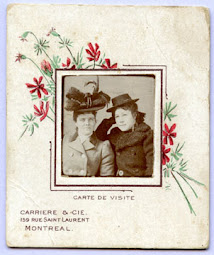Highlighted this week are
a selection of calling cards within the museum’s collection, displaying
elaborate head pieces and hairstyles worn by high society women. One sure way
to attract attention to oneself is through a fancy headpiece or hat. Hats such
as these were used to signify wealth and status rather than for functional use,
the larger the hat the more wealth to be boasted. These hats often sat upon a
mass of upswept hair – a perfect way to hide a bad hair day!
Calling cards, also called visiting cards or compliments cards, originated in France in the early 18th century. These decorative cards soon became an essential accessory to a fashionable, upper class life. Leaving one’s calling card at someone’s home was a way to express appreciation for a recent special occasion, offer condolences for an illness or passing, or simply a way to say hello and express interest. These cards came with strict guidelines of conduct that could lead to social exclusion if not followed properly. Below are clippings from the Ladies Home Journal answering questions regarding proper calling card etiquette.
This
selection of calling cards were purchased from printing company Carriere &
Cie of 159 Rue Saint Laurent, Montreal. The backside of the first card reads
“Annie Bill, Mrs. Duncan MacGillivray, Alexandria”



| "BETSY JANE - Where a call is intended for several ladies in the same house, a card should be left for each one. The turning down of a card simply means that it was left in person, and is a fashion belonging to the past rather than the present." |
| "A STAR - If the new neighbor has sent out cards to her husband's friends, who are unknown to her, and has set apart a special day for receiving them, and as you have not received a card, It is neither necessary or in good taste for you to call, and it would be specially inappropriate for you to go on her reception day. So many good books are written on etiquette that it would be impossible to say just which one is most desirable. Your letter was written too late for you to receive an answer at the time you desired." |